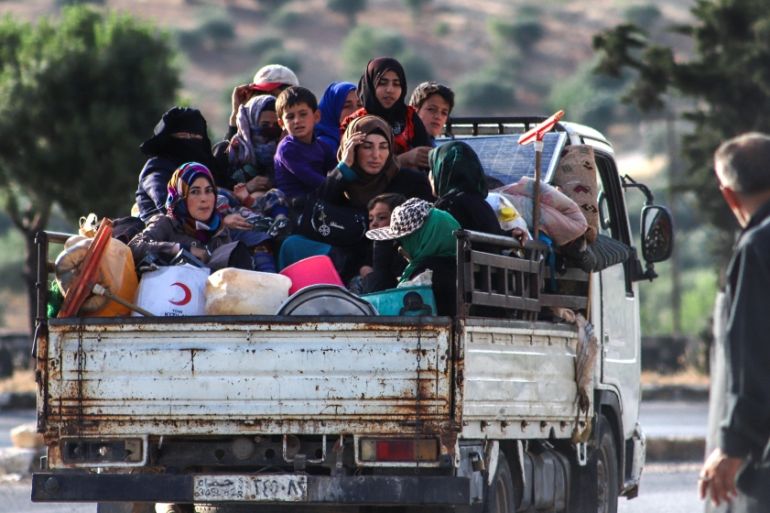UN experts decry continued abuse as Syria’s war grinds on
Report says President Bashar al-Assad’s government has ‘continued to perpetrate crimes against humanity’.

United Nations-backed investigators have pointed to signs that Syria’s government still continues to commit crimes against humanity including rape, torture, and murder as the country’s nine-year war grinds on.
The team on Tuesday also cited possible war crimes by a Turkey-backed coalition of rebel groups and called on Ankara to do more to help prevent them.
Keep reading
list of 4 itemsFighting in southern Syria following bombing kills 17: War monitor
Anti-Assad Syrians lead protests against prison torture by rebel group
Car bomb kills seven at crowded market in Syrian town near Turkish border
The report from the Commission of Inquiry on Syria, its 21st, was based on 538 interviews as well as documents, satellite imagery, and other evidence. It covers the first half of 2020 at a time when a ceasefire between rebels and the government and its allies has largely held in the rebel-held Idlib region since March – a relative bright spot in an otherwise dismal situation.
The UN Commission of Inquiry on Syria said assassinations and rapes of civilians by all sides, marked by “sectarian undertones”, were on the rise in the conflict that began in 2011.
|
|
But the commission noted how Syria faces new strains linked to the coronavirus pandemic, a currency and economic crisis, and stiff new sanctions by the United States on top of the war’s devastating toll over nearly 10 years.
The panel urged an easing of sanctions that compound the effect of lags in humanitarian aid deliveries because of COVID-19, and urged countries to take back their nationals who are the children of armed fighters from the ISIL (ISIS) group and women held by the thousands in squalid camps.
Torture and rape
The report cited “reasonable grounds” to believe Syrian President Bashar al-Assad’s government has “continued to perpetrate the crimes against humanity of enforced disappearance, murder, torture, sexual violence and imprisonment.”
It also said possible war crimes, including hostage-taking, torture and rape, may have been committed by the so-called Syrian National Army, a coalition of Turkey-backed rebel groups that controls a broad swath of territory along the Turkey border. They have been at odds with the Kurdish-led Syrian Defence Forces, which is opposed by Turkey’s government, in the northeast.
|
|
The commission said it was, for example, investigating reports at least 49 Kurdish and Yazidi women were held in the Ras al-Ain and Afrin regions by Syrian National Army members within the last year. It highlighted Turkey’s responsibility to “as far as possible, ensure public order and safety, and to afford special protection to women and children”.
“In Afrin, Ras al-Ain and the surrounding areas, the Turkey-backed Syrian National Army may have committed the war crimes of hostage-taking, cruel treatment, torture and rape,” panel chair Paulo Pinheiro told a news briefing.
“Turkey should act to prevent these abuses and ensure the protection of civilians in the areas under its control.”
Turkey’s defence ministry says it goes to great lengths to avoid civilian casualties during military operations in Syria.
Turkey wields influence as it funded, trained and allowed the Syrian National Army to enter Syria from Turkey, panelist Hanny Megally said.
“Whilst we can’t say Turkey is in charge of them and issues orders and has command control over them, we think that it could use its influence much more to bring them into check and certainly to pressure them to desist from the violations being committed and to investigate them,” he said.
‘Deeply concerning’
|
|
In areas held by the Syrian Defence Forces, the commission noted worrying conditions in the camps deteriorated, with medical services “stripped down to skeletal levels because of COVID-19”.
“The dramatic increase in those suffering from food insecurity in Syria in the first half of 2020 is deeply concerning,” said Karen Koning AbuZayd, one of the commission’s three members. “All barriers to the provision of humanitarian aid must be removed.”
Ankara and Moscow back opposing sides in Syria. Russia, along with Iran, supports al-Assad’s forces, and Turkey backs rebels trying to oust him. Turkey seized control of the border town of Ras al-Ain last year in an offensive to push back Syrian Kurdish YPG fighters, which Ankara views as a “terrorist” group.
Meanwhile, US President Donald Trump said on Tuesday he wanted to assassinate al-Assad in 2017, but that his then-secretary of defence Jim Mattis opposed the operation.
“I would have rather taken him out. I had him all set,” Trump told the morning show Fox & Friends. “Mattis didn’t want to do it. Mattis was a highly overrated general, and I let him go.”